By Ephraim Lapid, Ph.D., Member of
the Public Committee of the Zionist Archives, Brigadier General in Reserve,
former IDF spokesperson, senior intelligence officer, and spokesperson for the
Jewish Agency and the World Zionist Organization.
The story of Maurice Pearlman exhibits
Zionism at its best, in my opinion. A young man from Britain, who visited
Palestine during the 1936 – 1939 Arab revolt, volunteered for the British army
and made Aliyah as an Illegal immigrant with the Aliyah Bet, who became the
first spokesperson of the IDF. A Zionist figure of the first degree, which deserves
to be remembered with great esteem. Pearlman passed away in April 1986, during
my tenure as the 16th IDF spokesperson, and I had the honor of
eulogizing him on behalf of the IDF. At the start of my term, I met Pearlman,
known to everybody by the nickname Moish, to hear insights of an intelligent,
experienced man and learn about the beginning of the IDF
.
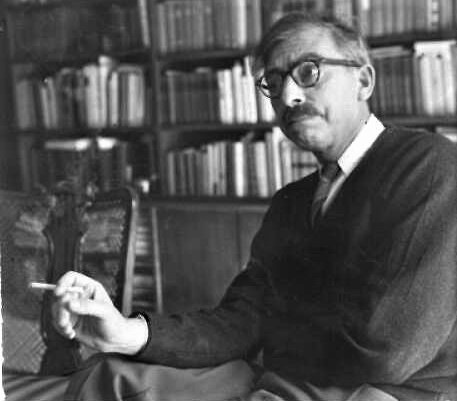
Moshe Perlman. Photo by Anna Riwkin-Brick (PHR\1164260)
Moshe (Maurice) Pearlman was born in
England in the Spring of 1911. In 1936, while a student, the news agency he was
working at assigned him to cover the 1936-1939 Arab Revolt in Palestine. He
resided in Kibbutz Ein Harrod for several months, where he studied Hebrew and
witnessed Jewish settlers fight. The encounter with the Jewish Yishuv changed
his attitude towards the Zionist idea, and he became an ardent Zionist. When he
returned to London in 1937, he wrote a book – "What has been happening in
Palestine?" (under the pseudonym M.P. Waters). He started working as the
press officer (spokesman) of the management of the World Zionist Organization,
under the president of the WZO, Dr. Haim Weitzman, and chairman of the WZO,
David Ben-Gurion.
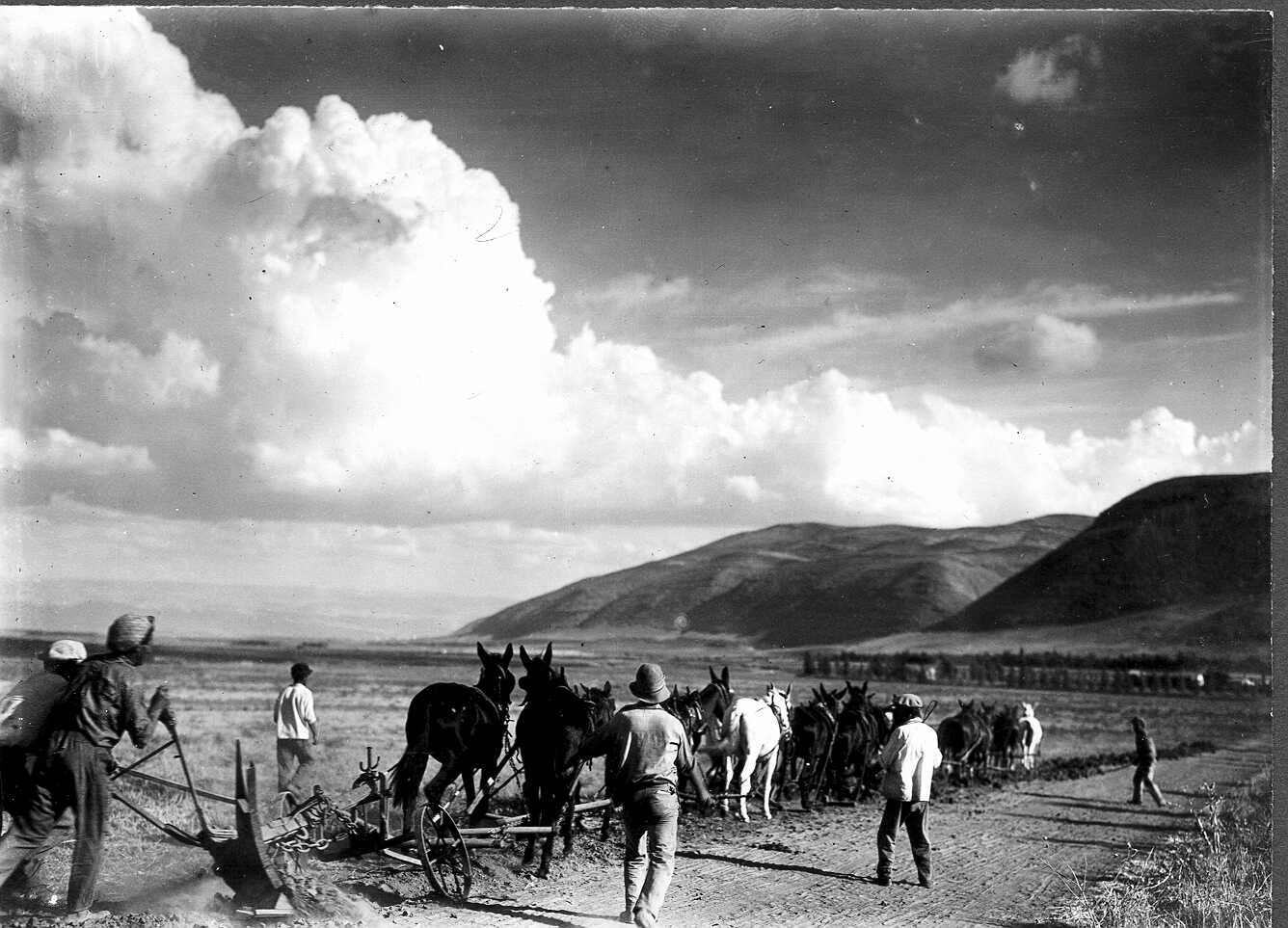
Members of Ein Harrod (PHKH\1260983)
At the outbreak of World War II,
Pearlman volunteered for the British army, took part in the invasion to North
Africa as an officer, fought in Italy and Greece, and received an honorary
distinction. His younger brother fell in battle on the Italian front. At the
end of the war, he served as the assistant to the British embassy's press
attaché in Athens. He met with emissaries of the Haganah and Hamossad leAliyah
Bet (a division within the Haganah that organized Jewish Illegal Immigration
into Palestine during the British Mandate). Alongside his official diplomatic
role, he also aided the Aliyah B. He was sent on clandestine missions to
various capitals in the Middle East, carrying his British diplomatic passport.
On April 1st, Pearlman boarded the
Aliyah Bet's ship "Theodor Herzl", with 2,600 illegal immigrants on
board, sailing from the shores of France to Palestine. The boat was under the
command of Mordechai Limon ("Moka"), the future commander of the
Israeli navy. When the British navy discovered the ship, the immigrants and Pearlman
were deported to Cyprus. Moish introduced himself to the British camp commander
as a British journalist covering the ship's journey. He was released from the
camp on the condition that he won't enter Palestine. He published a report, based
on his stay at the camp, in which he wrote about the children's village. He showcased
the extensive efforts made by the Jewish Agency to prepare the new immigrants for
life in the new state, despite the difficult
conditions in which they found
themselves.
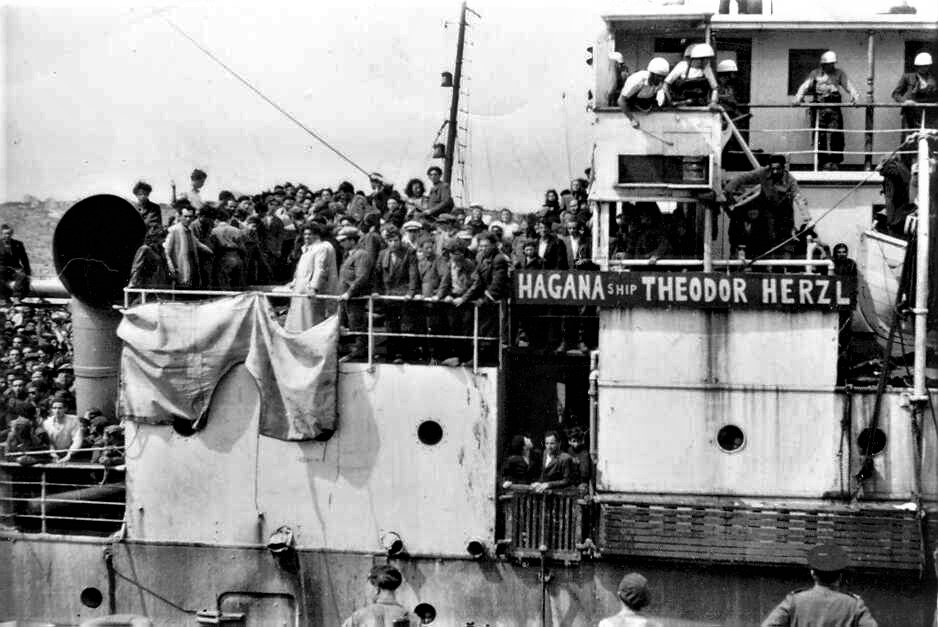
The Hagana ship Theodor Herzl (PHG\1009227)
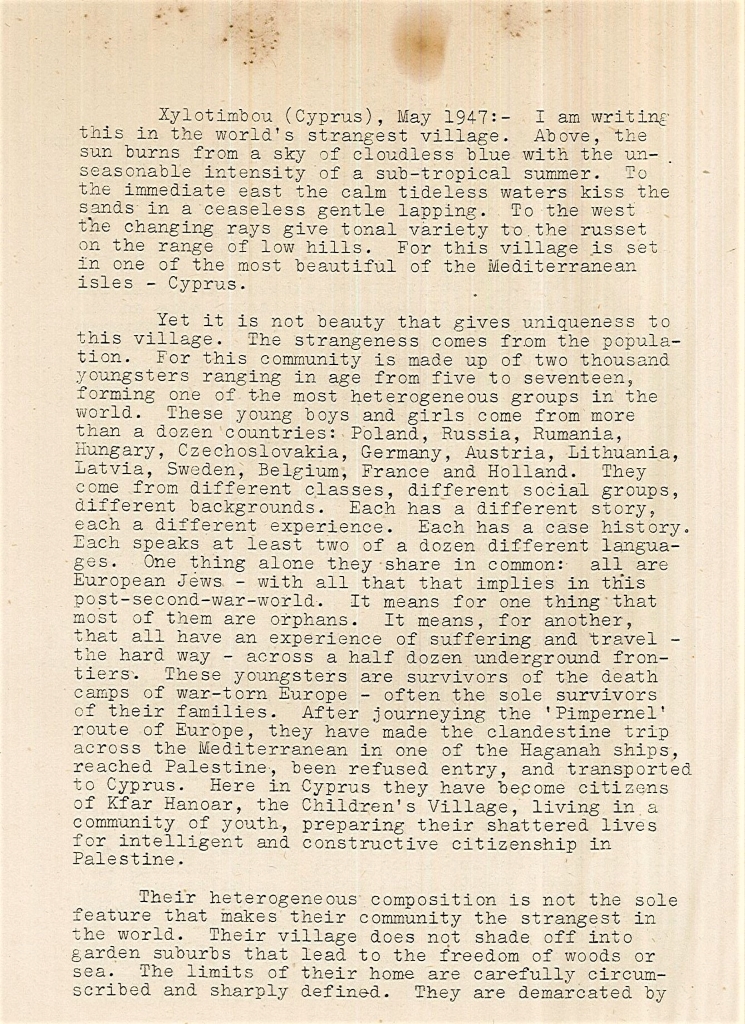
A report by Moshe Pearlman on the children's village in the Cyprus
detention camps, 1947 (DD1\1086). In the report, Pearlman described the unique
group staying in the children's camp: "This community, made up of 2000
youngsters from the age of 15 to 17… these boys and girls come from over 12
countries… they come from different classes, different social groups, different
backgrounds, to each a different story, a different experience… one thing they
have in common: they are all Europeans – with all that this implies after the
second world war. Most of them are orphans, and all suffered hardship and
displacement." Emissaries from Palestine taught the children and gave them
a sense of community, despite the children's heterogeneity and the shortage of
food and supplies.
With no opportunity to enter Palestine, Pearlman traveled to
France, where he covered the story of the Aliyah Bet's ship Exodus and the
deportation of illegal immigrants to Germany in September 1947. These stories,
especially those sent to the British press, where he described the plight of
the Jewish immigrants, raised global awareness of the problem of the Jewish
refugees and helped the Jewish Yishuv that hoped to bring more refugees to
Palestine
At the beginning of the War of
Independence, prime minister and defense minister David Ben-Gurion chose Moish
Pearlman to be the IDF spokesperson, with his military background, journalistic
experience, and perfect English. Ben-Gurion thought it more important for the spokesperson
to be a figure that would strengthen Israel's international support, rather
than someone who is familiar with Israeli society, as an Israeli
journalist, for instance.
At first, his role was defined as
"manager of the foreign press". However, over time, he became the
first spokesperson in the rank of brigadier general. Moish traveled in a jeep
across the country and battlefields with foreign journalists and senior foreign
affairs journalists. He served in this role until the end of 1951 – three years
of war, immigrant absorption, and regrouping the army.
As part of the press coverage of the
first large-scale training maneuver of the army's reservists, in October 1950,
Pearlman broadcast deterrence messages to the enemy that was regrouping for a
"second round". These broadcasts had many listeners. His voice, with
its
distinct Anglo-Saxon accent, was familiar to every citizen. ו
.
In 1950 the National Fund sent Pearlman on a short mission in England and France. He received fifty Palestine pounds extra, to buy himself the necessary civilian attire for such a mission, which, unsurprisingly, he did not possess.
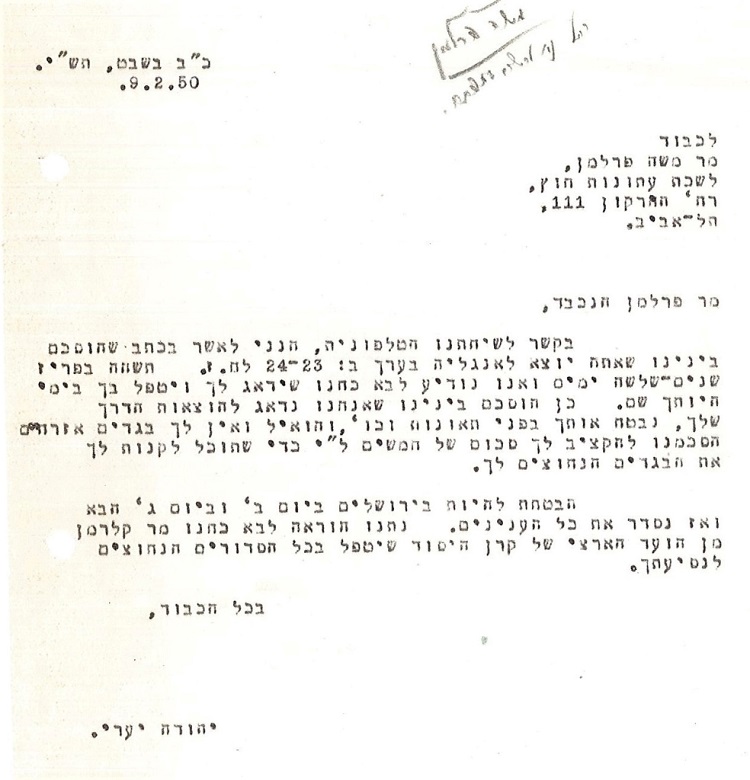
"Because you have no civilian attire... we agree to give you 50 Palestine pounds"(KH4\51924)
Moish Pearlman was discharged from
the IDF in 1951 and proceeded to fill various roles in the state's civil
service. He was manager of the government press office, head of intelligence
services (Hasbarah) at the office of the prime minister, and manager of "Kol
Yisrael" ("Voice of Israel"), Israel's broadcasting service. Later
on, he was appointed as Israeli ambassador to Kongo. At the end of his mission
in 1960, he retired from the civil service and focused on writing.
On the eve of the Six-Day War, defense
minister Moshe Dayan invited Moish to assist him in public and foreign
relations.
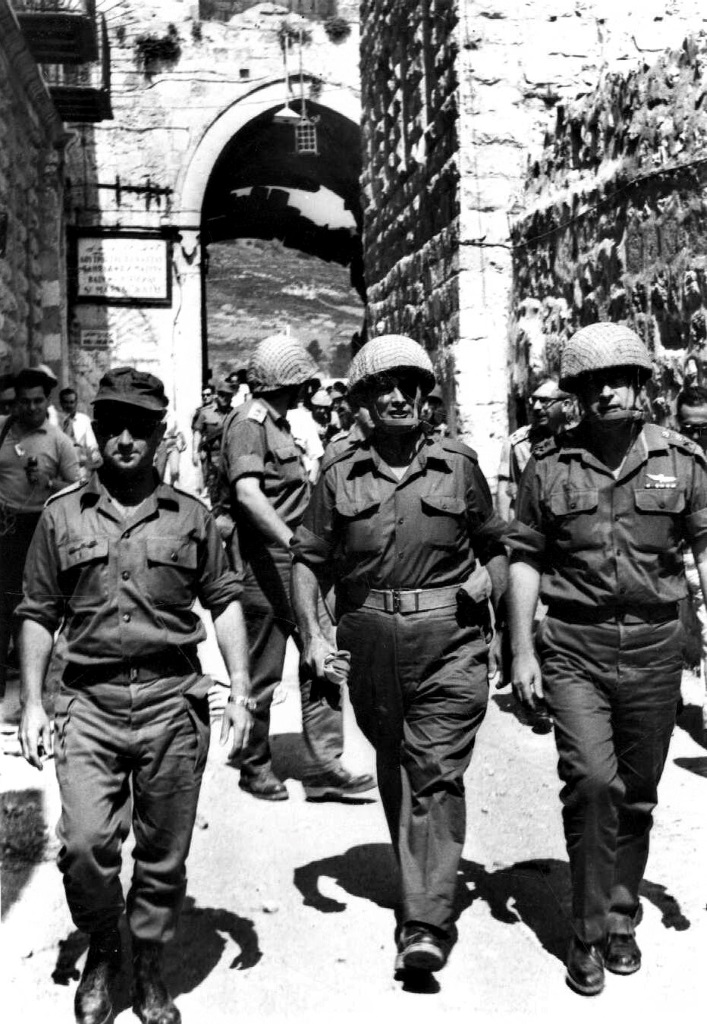
In the
historic photo of the entrance of defense minister Moshe Dayan to the old city,
through the Lions' Gate, with Central region Commander General Uzi Narkiss on
his right and Chief of staff Yitzhak Rabin to his left. Pearlman is seen in the
back, over Rabin's shoulder. Photo: Ilan Brunner, GPS (PHIS\1470404)
Moshe Pearlman died in 1986, at 75.
When I spoke at his funeral on behalf of the IDF, I said, among other things,
that Moish had a great privilege to be the first official spokesperson of Israel:
"Prime minister and minister of defense David Ben-Gurion has done well to
put in your hands, mind, and mouth the important mission of strengthening the
international support of Israel and the IDF in the time of the founding of the
state, during a challenging war with the Arab Armies. Ben-Gurion knew how to
appreciate your international professional experience, Zionist spirit, and connection
to people, which all served as an excellent basis for your success in this
complex role. The role you filled was later divided into four different
positions: IDF spokesperson, media consultant to the prime minister, media
consultant to the minister of defense, and head of the government press
office."
I initiated the "Moshe Pearlman
award for journalistic works on military and defense issues." Heading the
award committee was retired general Aharon Yariv. The award was awarded, among
the others, to TV reporter Eitan Oren. Unfortunately, the project did not
persist since.
Moshe Pearlman's archive is kept in
the National Library. However, his activity is portrayed extensively in the
documents of the institutions of the Zionist movement, the photo collection,
and newspapers collections of the Zionist Archives.
Published on 13.4.2022